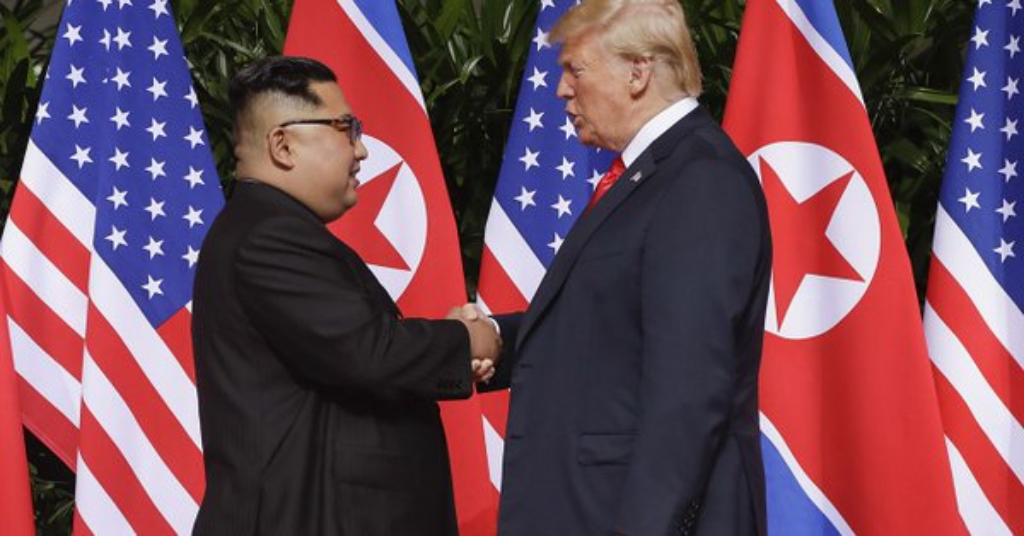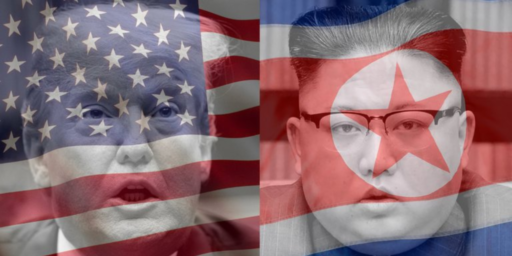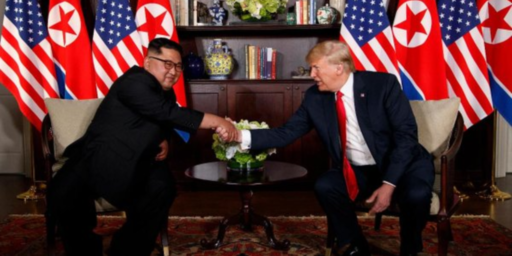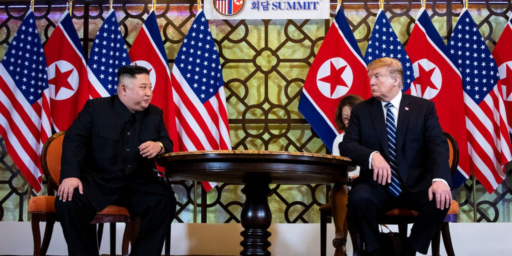North Korea Makes It Clear What It Means By ‘Denuclearization’
The North Korean government is making clear what it means when it speaks of denuclearization, and its far different from what the United States means.

North Korea is saying that denuclearization is out of the question unless the United States takes steps that we clearly are not going to take:
North Korea will not give up its nuclear arms unless the “U.S. nuclear threat to Korea” is eliminated, North Korean state media said Thursday.
The statement carried by North Korea’s official Korean Central News Agency was a particularly blunt indication that the two countries are still far apart on their ideas of what “denuclearization” means on the Korean Peninsula.
In a historic summit meeting in June, President Trump and North Korean leader Kim Jong Un vowed to work toward “complete denuclearization” on the peninsula but without detailed agreements on how that would be achieved.
Since his June meeting with Kim, Trump has claimed progress in negotiations with North Korea. But talks appear to have stalled as Pyongyang has demanded the removal of international sanctions as a precondition for denuclearization.
The North Korean statement said “the denuclearization of the Korean Peninsula” includes elimination of not only the North’s nuclear arms but also “the United States’ nuclear weapons and other invading forces in South Korea.”
“If we lay down our nuclear weapons first, that is not denuclearization, but putting ourselves in a defenseless state,” continued the commentary. “This will apparently shatter the balance of strategy of nuclear forces, as well as bring about a nuclear war.”
A number of analysts warned after the Trump-Kim summit that North Korea had little intention of giving up its weapons without substantial concessions in return from the United States.
“The statement shows that North Korea is not necessarily on the same terms as the U.S. on the idea of denuclearization. Pyongyang has constantly taken issue with the U.S.’s ‘nuclear umbrella’ over South Korea,” said Woo Jung-yeop, a researcher at South Korea’s Sejong Institute.
The United States withdrew its tactical nuclear weapons from South Korea in 1991, but continues to operate nuclear-armed bombers and submarines that can reach Korea from elsewhere, constituting a so-called “nuclear umbrella.”
Woo said the provocative statement on state media can be seen as a typical brinkmanship tactic from Pyongyang as it seeks to raise the stakes ahead of a potential second summit between Trump and Kim.
After the July meeting with Secretary of State Mike Pompeo, which came in the wake of the successful Singapore summit, North Korean media abruptly slammed the United States for its “gangster-like” demands.
Trump has said he plans to hold the summit in January or February, though he tweeted last week that he is “in no hurry,” as the talks are going “just fine” at the moment.
However, Pyongyang still has not responded to Washington’s call to resume working-level talks after abruptly canceling a planned meeting between Pompeo and his North Korean counterpart last month.
All of this comes just over six months after President Trump and North Korean leader Kim Jong Un met in Singapore for a much-hyped summit meeting. While the Administration and the President walked away from that summit claiming that great progress had been made, a mood perhaps best capped off by the President’s proclamation that North Korea was no longer a nuclear threat to the United States, the reality of what has actually occurred is far more complication. On the positive side, I suppose, there’s the fact that the two nations are continuing to meet with each other rather than hurl heated rhetoric at each other via the DPRK’s state television network and the President’s Twitter feed. As Winston Churchill once put it, it is better to jaw-jaw than to war-war. The main forum for those meetings have been discussions between Secretary of State Pompeo and Kim Yong Chol, a General who serves as the Vice Chairman of the DPRK’s Communist Party, acting as the chief North Korean diplomat, although the North Koreans have complained about what they call a “gangster-like” attitude among Americans. Additionally, as agreed at the meeting in Singapore, the North Koreans have turned over the suspected remains of more than 100 American and other soldiers who were killed during the Korean War and there have already been some successful identifications made from those remains.
Notwithstanding those positive developments, it has been apparent since virtually the moment the summit ended that most of what the Administration was touting as progress with regard to North Korea and its nuclear program was far less than meets the eye. The primary reason for this, of course, is that was apparent long before Kim and Trump met that the supposed agreement regarding denuclearization that was reached in Singapore wasn’t much of an agreement at all, primarily because the United States and North Korea do not mean the same thing when they use the term “denuclearization.”
To summarize the differences, when the United States talks about “denuclearization,” it is principally referring to the idea that the goal of these current talks, indeed perhaps the only goal, is for the DPRK to give up its nuclear weapons, its weapons research program, and its ballistic missile program. Leaving aside the fact that the regime in Pyongyang is unlikely to do this simply because the existence of the nuclear arsenal they do have is perhaps the best deterrent available to guarantee the survival of the regime, this stands in stark contrast to what the North Koreans mean when they talk about “denuclearization.” For them, it means the removal of all American troops from South Korea if not the entire region, including Japan, and the lifting of the so-called nuclear umbrella that the United States has in place which essentially reserves the right to use nuclear weapons in response to any attack on its allies in Seoul, Tokyo, or elsewhere in the region. Today’s announcement from Pyongyang makes that difference starkly clear and makes it clear that the Administration has been pursuing an unattainable goal as it continues its claim that it had some In
In addition to the rhetoric, though, North Korea’s actions since June have made it clear that the President basically walked away from Singapore with nothing. Just two weeks after the summit, for example, it was reported that North Korea was increasing production of the fuel needed to make additional nuclear weapons and that it was concealing the existence of ongoing nuclear weapons research at secret facilities well hidden from both surveillance and, most likely, the ability of the United States to take the sites out in a military strike. Additionally, it became apparent in the days after the summit that the much-publicized destruction of the DPRK’s primary nuclear weapons test site, a much-hyped pre-summit event that was witnessed by American and other international journalists was much less than met the eye and that the site could easily be rebuilt if needed in the future. Weeks later, we learned that the DPRK had also begun work on the construction of new ballistic missiles at yet another secret site. Additionally, analysts who have seen satellite images say that the DPRK has made a second large nuclear reactor operational. This type of reactor is capable of making plutonium which is, of course, one of the main fuels used in the production of nuclear weapons. This new reactor can reportedly make four times as much plutonium as North Korea’s current reactor, which has been the source for the plutonium needed for its nuclear arsenal to date. Finally, as recently as September it was reported that North Korea was continuing to develop nuclear weapons at secret sites that may or may not be known to American intelligence. Obviously, these are not the actions that one would expect from a nation that had agreed to “denuclearization” in the sense of giving up their existing nuclear weapons program and existing arsenal of weapons.
As I have said before, there are things that could be accomplished if both the United States and North Korea approached these negotiations realistically. Tensions on the Korean peninsula, which have been on a razor’s edge since the end of the Korean War and ramped up significantly last year during the tit-for-tat exchanges that took place between President Trump and the North Korean leader, have calmed down significantly this year and making that more permanent would be a good thing. Additionally, more formal negotiations aimed at bringing the Korean War to a formal end should be pursued, as should agreements designed to ease the conventional arms standoff across the Demilitarized Zone. However, as I have noted before (see here and here), if the United States continues to insist that the ultimate goal of these talks is the idea that North Korea will give up its nuclear arsenal, then these talks are doomed to fail. Today, as the year of apparent detente on the Korean peninsula comes to an end, the North Korean government made that clear.





But…but…Trump said he and Kim trust each other, and that they “fell in love.”
I don’t think Kim wants a deal. The conditions he asks are out of the question, or would be with a normal person in the Oval Office.
Consider, doing what Kim wants would leave the South exposed to an invasion. this is unlikely to happen, as I don’t think Beijing would like it. But Beijing would like the threat hanging there, so as they could bring the South closer into their sphere of influence. One wonders about japan as well. also Taiwan might get so nervous, they may decide to develop their own nuclear deterrent so China would keep on leaving them mostly alone.
The problem is Trump, as is almost always the case these days. He needs a “win” he can brag about, and what the hell might he do to get it? Undo the whole security order in Asia? Weaken the US against China?
Clinton wanted to go out of office with a treaty between Israel and the Palestinians. It didn’t happen, and not much progress has been made on the matter since. The issue of a nuclear North Korea dates from the same period, and past an initial treaty which didn’t last, no progress has been made since (though I suppose the Kims would argue they’ve made tons of progress). A rank amateur who doesn’t understand the issues involved and doesn’t even want to learn what they even are, is not going to solve the matter.
The point is not only North Korea. Russia and China deeply dislike the 40 thousand troops in Japan and South Korea for obvious reasons, and they will support North Korea while these troops are there. You can easily block Russian and Chinese ports with these troops.
Love Stinks!
@Kathy:
The main thing Kim wants is an assurance that his regime will be safe from attack. That’s why he aggressively accelerated the nuclear weapons program his father and grandfather had only been pushing forward slowly.
(YEH YEH)
@Doug Mataconis :
FIFY. Let’s be real: Kim could care less if NK, it’s people and the very ground beneath his feet crumbled so long as his butt was safe and in charge of somebody. He’s more aggressive because he’s feeling a lot less secure then his predecessors did in being absolute unquestioned ruler – living in an interconnected world makes the whole “isolated on purpose” thing harder and harder to effectively maintain. Add in Daddy and Granddaddy had a little more in the charisma and talent sections and you’re left with the third generation scion who’s never had to struggle in life let alone in the family business – traditionally the very person who causes or starts the decline of the dynasty.
Kim wants to make sure Kim’s taken care of. The nukes aren’t only to threaten the West with, mind you – they’d do perfectly well scoring the earth bare if his people ever turn on him….
“If we lay down our nuclear weapons first, that is not denuclearization, but putting ourselves in a defenseless state,”
To be fair (yeah, I know, what’s fairness got to do with policy) the man has a point, and we wouldn’t be willing to do what we are asking either.
@Doug Mataconis:
Yes. And there’s only so much even a superpower can do to control a client state. The Soviets had to send troops into Hungary and Czechoslovakia, they couldn’t handle Poland. So there’s no way China will control Kim. But they can use him, and he can use them.
Every analyst, or nearly so, agrees an invasion of North Korea, even absent nukes, would be a bloody slog. With nukes it’s plain suicide, and a sacrifice of South Korea.
So, no, China can’t and won’t control Kim. But it makes sense for Kim to coordinate with China, if for no other reason than to gain China’s favor and some resources and money. There are more ways for a tyrant to fall than invasion (ask the ghost of Ceausescu. he has to keep his people at a minimal standard of living, and his elite and the army in a lavish one, too; and keep his family in line. You can’t do all that with just nukes.